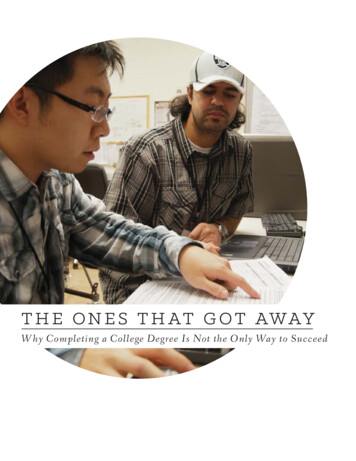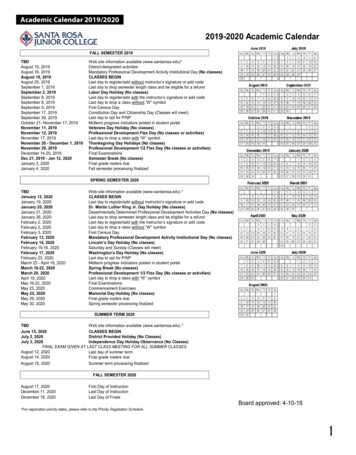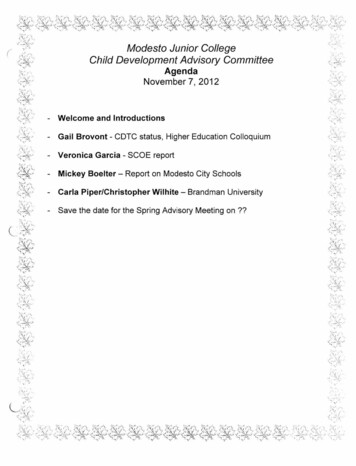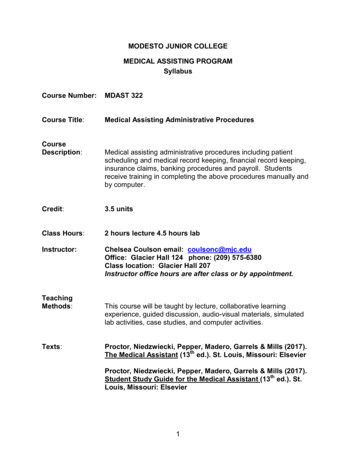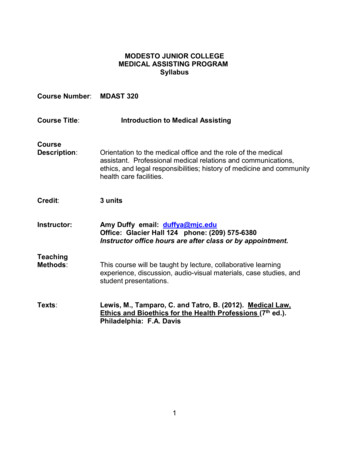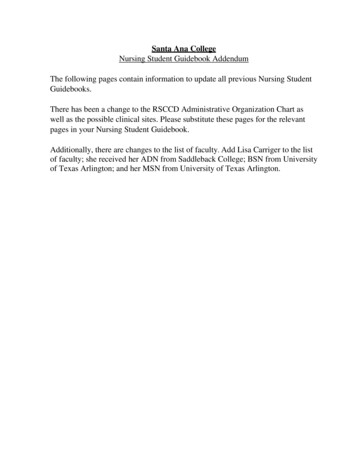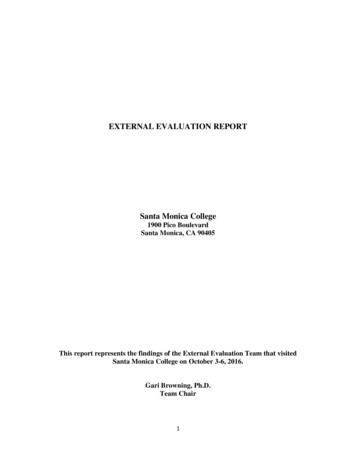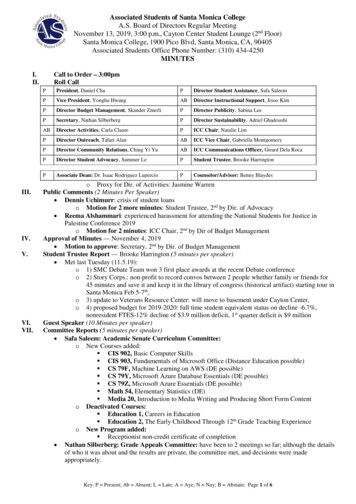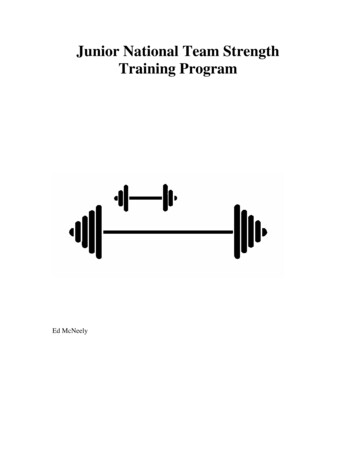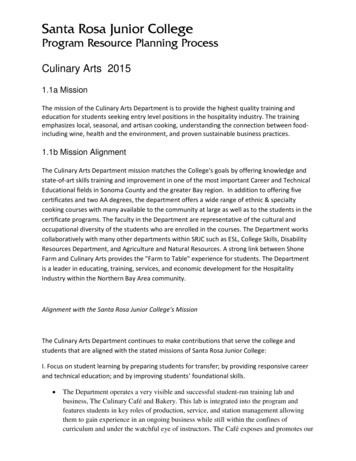
Transcription
Santa Rosa Junior CollegeProgram Resource Planning ProcessCulinary Arts 20151.1a MissionThe mission of the Culinary Arts Department is to provide the highest quality training andeducation for students seeking entry level positions in the hospitality industry. The trainingemphasizes local, seasonal, and artisan cooking, understanding the connection between foodincluding wine, health and the environment, and proven sustainable business practices.1.1b Mission AlignmentThe Culinary Arts Department mission matches the College's goals by offering knowledge andstate-of-art skills training and improvement in one of the most important Career and TechnicalEducational fields in Sonoma County and the greater Bay region. In addition to offering fivecertificates and two AA degrees, the department offers a wide range of ethnic & specialtycooking courses with many available to the community at large as well as to the students in thecertificate programs. The faculty in the Department are representative of the cultural andoccupational diversity of the students who are enrolled in the courses. The Department workscollaboratively with many other departments within SRJC such as ESL, College Skills, DisabilityResources Department, and Agriculture and Natural Resources. A strong link between ShoneFarm and Culinary Arts provides the "Farm to Table" experience for students. The Departmentis a leader in educating, training, services, and economic development for the HospitalityIndustry within the Northern Bay Area community.Alignment with the Santa Rosa Junior College's MissionThe Culinary Arts Department continues to make contributions that serve the college andstudents that are aligned with the stated missions of Santa Rosa Junior College:I. Focus on student learning by preparing students for transfer; by providing responsive careerand technical education; and by improving students’ foundational skills. The Department operates a very visible and successful student-run training lab andbusiness, The Culinary Café and Bakery. This lab is integrated into the program andfeatures students in key roles of production, service, and station management allowingthem to gain experience in an ongoing business while still within the confines ofcurriculum and under the watchful eye of instructors. The Café exposes and promotes our
programs to the general public while providing education for the students and serving thecommunity. The restaurant and bakery feature local and seasonal offerings includingthose from Shone Farm. All items offered for sale in the Café and Bakery are producedon-site by students. The Department operates The Culinary Career Center connecting students, alumni andgrads with over 350 northern California employers. In addition to employmentopportunities, the Center is also a resource to individuals, businesses and non-profitorganizations seeking assistance at special events – parties, fundraisers and festivals. Theculinary student participates in “experiential learning” and the community member gainsa direct connection to our program and our students. The Department participates in a number of outside events with the students including:The Taste of Sonoma, the Women’s History Month Luncheon, the Sonoma CountyHarvest Fair, Shone Farm Fall Festival, Sonoma Harvest Wine Auction, the SteelSommelier Challenge, Day Under the Oaks, and in 2015 the SRJC Wine Classic wasadded to the rotation.II. Multi-campus coordination:The Department offers classes at three locations in the District:The B. Robert Burdo Culinary Arts Center on the main Santa Rosa campus, the PetalumaCampus, and the Dutton Pavilion at Shone Farm.The Department typically offers a single section of Sanitation and Safety at the PetalumaCampus.III. Institutional Planning:The Culinary Department is a high profile and successful CTE program being run with limitedstaffing. The Department would like to see more consistent linkage between district budgetingand resource allocation within the planning process.IV. AccreditationThe Department successfully managed to complete the 2011 PRPP process in convergence. TheDepartment completed 100% of its course SLO's in May 2011. The Department continues toactively assess SLO's.V. SLO’s and Assessment:The Department has developed program level SLO's for both of the 18 unit certificates as wellas for two degree majors. Assessment-based rubrics are integrated into all certificate courses inthe department. The fulltime faculty are all actively engaged in SLO assessment, as are themajority of adjunct faculty.VI. Basic Skills
The Department incorporates basic skills into all of the classes taught in the certificateprograms. In addition, the department continually coordinates with the College Skillsdepartment in offering a Culinary Math course, embedding basic math and English skills intoevery culinary class, with ESL in offering a Vocational ESL course for Culinary Arts. We continueto research grant proposals and apply for Basic Skills Initiative funding in order to develop orimprove courses that will directly address the basic skills needs of the culinary arts student.VII. Enrollment Management & RetentionCulinary Arts has continued to grow and serve student needs programmatically over the lastfive years. If the current State budget allowed, the department could fill classes 7 days a weekand 5 nights a week maximizing the space available in the new Culinary Arts Center andenabling the department to offer classes over a wide range of times and date to meet thescheduling challenges of a student population that frequently has to balance family, work, andschool needs. The Culinary Department continues to have very high retention rates, well abovethe SRJC average. Student headcount reached an all-time high for the Department in Spring2008 of 1513 but dropped to 927 in S2013 due to schedule reductions. With the rebuilding ofsections the headcount has counced back to 1144 in Spring 2014 representing a 23% increaseyear to year. The Department had a high enrollment efficienct at 92% in Spring 2014 comparedto the district average of 78%.VIII. Integrated Environmental Planning:The Culinary Arts Department has begun the process for development of a collaborativeprogram of study with the Foods and Nutrition and Sustainable Agriculture Programs. Themission of our combined programmatic efforts is to improve the health and well-being of ourstudents and the community through education and learning that promotes affordable,sustainable and nutritionally optimal food and food related choices.The new Culinary Arts Center is now open since January 2012, although the building identifiedby the district to be the "Greenest" building that the District has built, the most progressivecomponents of the building could not be included due to budget constriants. At this point, thebuilding still has numerous green technologies built in and has utilized extensive green buildingmaterials during construction.The Department currently has joined forces with Shone Farm to deal with solid food wastethrough a composting program.1.1c Description
Description: The Culinary Arts Department offers 5 CTE certificates, 2 AA degrees, and due tothe California State budget crisis, Ethnic and Specialty Cooking classes were cut to the pointwhere only 2-3 were being offered per semester. When the state budget crisis eased, theDistrict allowed the Department to increase Ethnic and Specialty Cooking class sectionsbeginning in 2013. In 2013, 14 sections of Ethnic and Specialty Cooking classes were offered; in2014, this increased to 37. These classes are very popular and always well enrolled. In additionto class offerings, the Department runs the Culinary Café and Bakery at the Culinary ArtsCenter, and participates in numerous food and wine events.The certificate programs and AA degrees attract a diverse group of students interested incareers in Food Service, Restaurants, Hotels, and Catering. The Ethnic and Specialty cookingclasses serve members of the community interested in improving their personal cooking skills,and their health and wellness. These Ethnic and Specialty courses are also electives in theCulinary Major and are taken by many certificate and degree students. Many first time Culinarystudents take an Ethnic and Specialty class and eventually decide to go through one of thecertificate programs. All of the classes in the programs emphasize eating locally, healthfully,and sustainably.The Department has created and successfully launched the Culinary Career Center. The Centerplays an important role in this CTE program by connecting job-seeking students, alumni, andgrads to employers. To date, the Center has assisted more than 500 job seekers with findingemployment at over 350 northern California employers.In addition to the academic programs, the department provides a very visible face of theCollege to the community through the Culinary Café and Bakery.1.1d Hours of Office Operation and Service by LocationHours of Operation: The Culinary Arts Department holds classes at three locations:The Culinary Arts CenterPetaluma CampusThe Dutton Pavilion at Shone FarmThe Department holds classes at the Culinary Arts Center Monday-Friday from 7:00 am-10:00pm. These classes are mostly part of the Culinary Arts, Baking and Pastry, Front HouseOperations, Dining Room Service, and Restaurant Management Certificates and Majorprograms. Additionally, the Department offers Ethnic and Specialty cooking classes designed forthe continuing professional and certificate student. Before the current budget cuts, classes in
the Ethnic and Specialty area were also offered almost every Saturday and Sunday from 9:00am-5:00 pm. This schedule is for the Fall, Spring and Summer semesters, with a slightly lightercourse offering in the 8-week Summer semester.The staffing at the Culinary Arts Center includes: 1, 100% Classified AAIII who works 8 hours per day, M-F (12 months)1, 100% Classified Culinary Operations Specialist who works 8 hours per day M-F(12 months. Partly paid from Café revenue.) 1, 100% Classified Lab Asst. III who works 8 hours per day M-F (11 months) 1, 45% Classified Heavy Cleaner who works 18 hours per week, M-T 6-9pm and W-F4-8pm (paid from Café revenue) 2, STNC Counter Managers. One works 25 hrs./week W-F 7am-4pm; one works19.5 hrs./week W-F 9am-4pm, 35 weeks per year (paid from Café revenue) 1, STNC Lead Cashier who works 6 hours per day W-F, 19.5 hrs/week (only hired if onlyone Counter Manager employed), 35 weeks per year (paid from Cafe revenue)There is currently no staff coverage for any of the numerous evening and weekend classes heldin the Burdo Center.The Department also offers 1-3 Ethnic and Specialty classes per semester at the Shone FarmDutton Pavilion. At this location, the Department has no staff support.The Culinary Department is exploring multiple new ideas to increase revenue at the CulinaryArts Center including Team Building, Catering, Breakfast Service and others.The New Burdo Culinary Arts Center:In January 2012, the new Culinary Arts Center opened. The Department holds classes at theCulinary Arts Center Monday-Friday from 7:00 am-10:00 pm. These classes are mostly part ofthe Culinary Arts, Baking and Pastry, Front House Operations, Dining Room Service andRestaurant Management Certificates and Majors programs. Additionally, the Department offersEthnic and Specialty cooking classes designed for the continuing professional and certificatestudent. The Culinary Café and Bakery operate in this new location W-F, 7:30am until 2pm withdays and hours of operation based on the college calendar. Over time, the Department intendsto expand operations to include additional days and hours of operation as yet to bedetermined. The Department intends to expand the certificate offerings to include certificatesin butchery, advanced culinary, vegetarian cooking, catering, bread baking, and confections.Once the catering certificate is in place, the Department will have the possibility to increaserevenue by catering to the College Community.The staffing needs at the Burdo Culinary Arts Center include:
Convert the STNC Lead Cashier to 62% Classified Lead Cashier 11 months* Convert one of the two STNC Counter Managers to 62% Classified Counter Manager 11months* New 50% STNC administrative assistant for the Career Center 2 Student Lab Assts. 25 hours/week, 11 months* these positions could stay as STNC at the increased load if funds are unavailable.The Department has proposed supporting the cost of a portion of these positions through therevenue generated by the Culinary Café and Bakery.1.2 Program/Unit Context and Environmental Scan1. Program/Unit context and environmental scan: The short and intensive certificate programsin the department allow students to achieve certificates quickly and find employment whilecontinuing their general education. The Department has seen an increase in the number ofstudents working towards a Culinary Arts Major.The Culinary Arts Department serves over 2,500 students annually. The Department has asuccessful course completion rate of 82.8% compared to the district average of 71.4%. TheDepartment awards one of the highest number of certificates College-wide.Student headcount reached an all-time high for the Department in Spring 2008 of 1,513 butdropped to 927 in S2013 due to schedule reductions. These drastic schedule reductions havecaused students to delay completion of their certificate or major.With the local economy recovering, the department has seen enrollments escalate as newestablishments are opening and existing establishments are expanding. The interest in culinarycareers continues to skyrocket. Faculty see a great need for the restoration of courses andsections to begin immediately to accommodate both new students and continuing studentswho are eager to complete their certificate or major and move into the workforce. Currentlyover 1200 students enrolled in Spring 2014.
The Department sees very few students transferring to 4-year schools because the focus of ourprograms is on workforce development. The private culinary schools (which used to attract ourcertificate-holders) charge 45,000-75,000 for an education equivalent to SRJC's Culinary andFront House programs. SRJC faculty are fully confident that the programs at SRJC are as good orbetter than the private schools, and no longer advise students to consider that transfer option.The Department is committed to offering affordable training for students to get solid entrylevel jobs at which they can quickly move up, and eventually hone their skills over the course ofa career.According to the National Restaurant Association: in 2013 eating establishments accounted for1,475,100 jobs in California —10% of employment in the state. By 2023, eating establishmentsin California are projected to employ 1,615,600 people, a 9.5% job growth.The Culinary department’s Career Center and its job-match program has become anindispensable leg of support in helping the Department’s students get the jobs for which theyare being trained. As ours is the only professional culinary program in Sonoma County,employers have welcomed this service and depend on it for staffing needs. Thanks to thecommitment of the job-match coordinator, students and graduates are working in an increasingnumber of restaurants in the North Bay. In this way the Department is also better able to trackstudent success. The Culinary Career Center has solidified the Department’s reputation, andgiven employers a place to find the competent workforce they seek.Permanent staffing is one of the Department’s biggest priorities. Much of what has beenplanned in terms of future certificate growth, and interdepartmental collaboration iscontingent on permanent staffing support.The Department works cooperatively with six local High School Culinary Programs and hasCareer Pathways in place with most of these schools. The Department articulates its programs,hosts tours for the high school culinary teachers, and hosts informational luncheons for middleschool and high school students. Culinary has implemented credit-by-exam for one of theprerequisite lecture courses – Sanitation and Safety - and the Knife Skills course.The local food, wine, and tourism industries continue to expand through the economy’srecovery. According to the Sonoma County Board of Supervisors, “The tourism and hospitalitysector was the basis and the backbone of our recovery after the economic downturn in 2008.This sector employs 17,000 workers and annually provides about 80 million in tax revenue tolocal government.”Northern California is at the center of the national “locavore” food movement. Sonoma Countyis the home of over two dozen organizations involved in the promotion of growing, purchasing,cooking and eating local, healthy, sustainable foods (http://www.igrowsonoma.org). Thismovement has provided impetus to expand sustainable farming practices which helps the localeconomy and supplies the fresh foods to the restaurant industry as well as the local farmer'smarkets. "Buying into the Local Food Movement," a consumer study conducted by globalmanagement consulting firm A. T. Kearney, assessed how shoppers make decisions about
buying local versus non-local food. Results showed that local food is a trend that consumershave embraced and that a strong majority of U.S. consumers will pay a premium to buy localfoods; 30 percent say they will take their business elsewhere if a business doesn’t offer them.With the move of the Culinary department to the Ag/Natural Resources cluster, we are in stepwith this growing trend. As the interest in sustainably produced local food grows, the interest incooking and healthy eating will continue to grow. This growth will continue to keep theDepartment’s enrollments high and demand for new courses even higher.The Department was shifted from The Business and Professional Studies cluster in January 2013and is now under Dean Ganesan Srinivasan and part of the newly formed Agriculture, NaturalResources, and Culinary Arts Cluster. The Department has been excited by the possibilities forfuture collaborations with the Ag department and has been very pleased with the quality ofwork being performed by the new Dean.One of the difficulties the department faces is finding adjunct instructor candidates who haveyears of industry-related experience yet also possesses the formal education to meet theminimum qualifications. The last interview for the adjunct pool was Fall 2013. This resulted inthe approval of three (3) candidates, but two (2) were subsequently rejected for failing to meetminimum academic qualifications. We are currently still in need of at least one (1) moreadjunct.2. Does the program have adequate contract and adjunct faculty to support its needs? Thedepartment currently has 10 adjunct faculty. The Department currently has five contractfaculty. Considering the growth of the department, the addition of classes/sections, andupcoming sabbaticals, instructional staffing is dangerously low.The Department plans to increase the Café and Bakery businesses by at least doubling thehours of operation to include evening and weekend openings. We have plans to add severalmore certificate offerings in order to be able to accommodate current and returning studentsand to respond to our industry’s needs. These certificates include: Catering, Vegetarian, CakeDecorating, Chocolate Technique, Butchery, Bread, and Garde Manger. We do not currentlyhave the instructional staff to implement these certificates.In alignment with the College’s stated commitment to pursue Green initiatives, we also intendto increase our collaboration with Sustainable Ag, Shone Farm, and the small farmingcommunity. The Culinary Department is in a position to support issues of sustainabilityconcerning the current food system. The College’s location in an agricultural county and agastronomic hub gives us an im
The Culinary Arts Department mission matches the College's goals by offering knowledge and state-of-art skills training and improvement in one of the most important Career and Technical Educat
